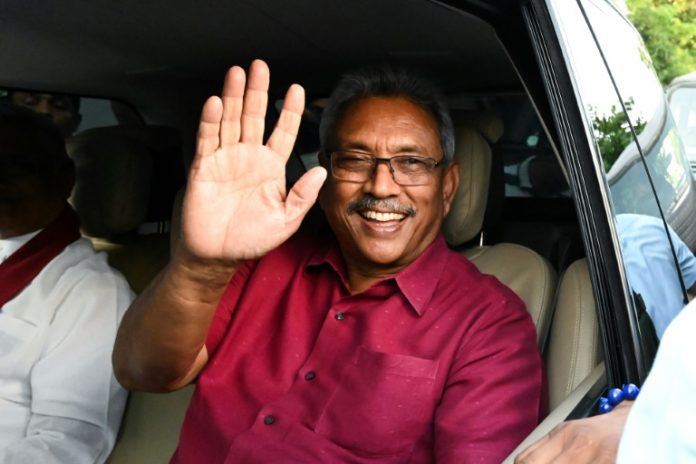Sri Lanka’s new president Gotabaya Rajapaksa was sworn in Monday at a Buddhist temple revered by his core Sinhalese nationalist supporters, following an election victory that triggered fear and concern among the island’s Tamil and Muslim minority communities.
Rajapaksa’s landslide win split the nation of 21.6 million people on religious and ethnic lines as never before, seven months after deadly Islamist attacks rocked the country.
The former defence secretary is lauded by his majority Sinhala-Buddhist community for leading a no-holds-barred military campaign that crushed Tamil rebels and ended a 37-year separatist war in 2009 when his brother was president.
Rajapaksa took his oath of office at an ancient temple at Anuradhapura, in the northern part of the island.
He did so facing the temple’s stupa, which is the tallest in Sri Lanka and dates back more than two millennia.
The imposing structure is said to have been built by a Sinhalese king who is venerated by Sri Lanka’s Buddhists for vanquishing an invading south Indian Tamil ruler.
Around 40,000 Tamil civilians were allegedly killed at the end of the civil war in 2009.
Saturday’s election saw the country’s Tamils, who account for about 15 percent of the population, vote overwhelmingly against Rajapaksa.
During his brother’s 2005-15 presidency Gotabaya had unfettered control over security forces, while “death squads” that abducted dozens of dissidents, opponents, journalists and others also allegedly reported to him.
Many people were never found again after being bundled into feared white vans, while some were killed and dumped by roadsides. Rajapaksa has denied any involvement.
He has resisted international calls to investigate the alleged war crimes.
At his only press conference during a three-month election campaign, Rajapaksa reiterated that he will not allow Sri Lankan troops to be tried by any war-crime tribunal, foreign or local.
He had also pledged to exonerate and free from prosecution the dozens of military personnel accused of abductions, extortion and killings during his brother’s decade in power.
In his brief acceptance speech at the announcement of the final election results on Sunday, Rajapaksa pledged to work for all Sri Lankans.
“I am the president of not only those who voted for me but also those who voted against me… irrespective of which race or religion they belong to,” Rajapaksa said.
“I am deeply committed to serve all the people of Sri Lanka.”
The island’s minority Tamils have been campaigning for greater autonomy in areas where they are concentrated.
Tamil youth took up arms in 1972 demanding a separate state and their violent guerilla campaign at its height saw them control a third of the country.
After being in opposition for nearly five years, the Rajapaksa family’s comeback came after the Sinhalese-Buddhist community and the powerful Buddhist clergy rallied behind them.
Rajapaksa formally announced his intention to run for the presidency just days after Islamist attacks on April 21 that killed 269 people, promising to protect the nation.
The Easter Sunday suicide bombings on three upscale hotels and three churches was carried out by a homegrown outfit from among Sri Lanka’s Muslim minority, who make up 10 percent of the population.
It shocked the nation, and the world, just as Sri Lankan tourism was booming and as the nation prepared to celebrate a decade since the end of the Tamil separatist war.
Rajapakasa insisted that extremists would not have carried out any attacks if he had been in power. He blamed the government of Prime Minister Ranil Wickremesinghe for weakening the intelligence apparatus he had built.
















